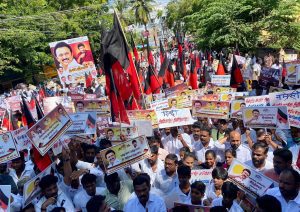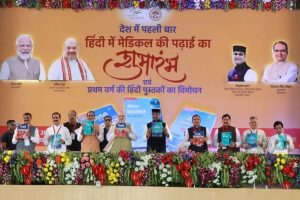This Union government led by the BJP is not the first to promote Hindi over other languages. The Congress has been the pioneer of three-language formula. Yet why is the anger singularly aimed at the BJP?

The Union Minister for Home Affairs and Cooperation Amit Shah and the members of the Committee of Parliament on Official Languages submitted the 11th Report of the Committee of Parliament on Official Languages to President Droupadi Murmu in New Delhi on 9 September 2022 (PIB)
The Bharatiya Janata Party (BJP)-led Union government has come under severe fire from opposition parties in the last few weeks over Hindi imposition.
From MK Stalin in Tamil Nadu to KT Rama Rao in Telangana, Pinarayi Vijayan in Kerala to HD Kumaraswamy in Karnataka, from Rahul Gandhi of the Congress to Sitaram Yechury of the CPI(M), leaders cutting across party and state lines are seeing red over the Union government’s aggressive promotion of Hindi.
The majoritarian politics of ‘Hindi, Hindu, and Hindustan’ has been the BJP’s go-to strategy, bringing the party tremendous success.
Opposition parties have been walking on eggshells around two of the issues: ‘Hindu’, due to the BJP posturing itself as the lone representative of Hindu interests, and ‘Hindustan’, with the saffron outfit’s claims of being an ultranationalist party.
The third — ‘Hindi’ — seems to have become the most tangible shot at derailing the BJP’s brand of identity politics.
The BJP’s push for Hindi imposition has turned it into the perfect stick to beat the saffron party with in non-Hindi-speaking states through language rights and equality campaigns. Assertion of regional identities and pride is fast becoming the counter to ultranationalist, majoritarian hegemony.

Anti-Hindi protest in Dharmapuri by the DMK youth and students wings on 15 October (Twitter/DMKYouthWing)
The push for Hindi, however, is neither new nor introduced by the BJP. Central recruitment exams have always been in Hindi and English, as BJP leaders have said and its national general secretary CT Ravi pointed out in this interview to South First.
According to the 2011 Language Census, only 12 out of 35 states and Union territories (before Andhra Pradesh and J&K were divided) chose Hindi as their preferred language of communication. Yet Hindi has its own special department to promote it.
Some basic facts:
Hindi is not our national language.
Hindi is one among the 22 languages listed in the Eighth Schedule of the Constitution.
Article 343 of the Indian Constitution deems Hindi along with English official languages.
Article 120 asks business in Parliament to be conducted in English and Hindi.
Article 344 deems it the duty of the commission or committee of Parliament, currently headed by Union Home Minister Amit Shah, to make recommendations to the President on progressive use of Hindi for official purposes. But here’s the catch: the commission is supposed to “give due regard … to the just claims and the interests of persons belonging to the non-Hindi speaking areas in regard to public services”. The concern from non-Hindi-speaking states is that the recommendations or the policies of the government do not take their interests into consideration.
When Shah makes statements such as “Hindi should be an alternative to English,” what he doesn’t get is that Hindi is just as foreign and alien as English to a Kannadiga or a Tamilian.
Governments after governments at the Centre, irrespective of the party in power, have promoted Hindi over other regional languages, mostly as a Constitutional mandate.
So why then is this anger singularly aimed at the BJP? These numbers may provide insight.
Between FY 2009–10 and FY 2013–2014, the Union government under the UPA led by the Congress spent ₹189.17 crore on the Department of Official Language meant to promote Hindi. From FY 2014–2015 till FY 2020–2021, the Union government under the BJP has spent ₹408 crore on it.

Union Minister of Home Affairs Amit Shah launches an MBBS book in Hindi on 16 October 2022 (Twitter/CMMadhyaPradesh)
Even if one were to only take the five-year period FY 2014–2015 to FY 2018–2019 into account, the BJP-led government spent ₹280.5 crore to promote Hindi.
Meanwhile, between 2017 and 2020, the Union government spent barely ₹29 crore on five classical languages — Tamil, Telugu, Kannada, Malayalam, and Odia. Four out of the five classical languages are from the South.
Opposing Hindi imposition has become a unifying cause even for civil society outfits such as the Karnataka Rakshana Vedike in Karnataka or Bangla Pokkho in West Bengal.
On Tuesday, the Tamil Nadu Assembly even adopted a resolution against Hindi imposition with Chief Minister MK Stalin delivering a whiplash speech against the BJP.
From the National Education Policy to Central recruitment exams in PSUs, banking, railways, etc., the bias in favour of Hindi leaves the rest of Indian citizens disadvantaged. As long as Hindi is the lone regional language permitted in these nationwide exams, there will never be a level playing field. An Indian who speaks Assamese or Malayalam must have the same chance at cracking these exams as someone who speaks Hindi for recruitment to be fair. That is not the reality now.
Whether it was the hijab row in Karnataka, public flogging of Muslims in Gujarat, remission to convicts in Bilkis Bano case, bulldozing of Muslim homes in Uttar Pradesh, leaders from opposition parties — especially the Congress — have been muted in their approach, largely due to the fear of being branded pro-Muslim and hence by default anti-Hindu by the BJP.
But in the matter of language, despite their party being the pioneer of the three-language formula, Congress leaders have been vocal in their criticism of the Union government’s Hindi imposition.
“Every state should have the right to use its language and if the students want to write exams in that language, then they should be allowed to do so,” Rahul Gandhi told job aspirants in Karnataka during an interaction as part of the Bharat Jodo Yatra.
Just days earlier, while responding to a question from South First on concerns of southern states over regional identity and federalism, he had said all states have equal space.
A host of leaders have come down heavily on the latest recommendations made by the Committee of Parliament on Official Languages headed by Shah.
“The consequences of the confrontation between the Modi government and the non-Hindi speaking states will be disastrous for the country,” P Chidambaram of the Congress noted.
“Union Govt’s Hindi Imposition move is an onslaught on India’s cherished ideal, unity in diversity. It will disadvantage a vast majority of Indians in matters of education and employment. This callous move, an affront on cooperative federalism, has to be opposed unitedly,” Pinarayi Vijayan, chief minister of Kerala, opined.
“India does NOT have a National language & Hindi is one among the many official languages. To impose Hindi by way of mandating in IITs & central govt recruitments, NDA govt is flouting the federal spirit. Indians should have a choice of language & we say No to #HindiImposition,” K T Rama Rao, Telangana minister for IT and working president of the TRS, said.
“Imposing RSS vision of ‘Hindi, Hindu, Hindustan’ on India’s unique and rich linguistic diversity is simply UNACCEPTABLE,” Sitaram Yechury of the CPI(M) said earlier last week.
Imposing RSS vision of ‘Hindi, Hindu, Hindustan’ on India’s unique and rich linguistic diversity is simply UNACCEPTABLE.
All 22 Official languages listed in the 8th schedule of the Constitution must be treated and encouraged equally.
India is a celebration of its diversities. pic.twitter.com/Bg5spY5iQK— Sitaram Yechury (@SitaramYechury) October 9, 2022
“If you indulge in politics of Hindi imposition simply because you have a majority, India will see a crisis over language. India is not just about Hindi and Hindu. It belongs to all of us,” HD Kumaraswamy, JD(S) legislature party chief said.
The words used by all the leaders are similar, warning the Union government of imminent disaster if Hindi imposition continues.
For the BJP that has won over the Hindi heartland, promoting the language is a political investment to create more opportunities and advantages for its Hindi-speaking electorate even in non-Hindi speaking states.
The ones losing out due to this imposition are non-Hindi speakers who are denied a level playing field — translating to missed opportunities in Central government recruitment, national-level competitive exams, central professional institutions and eventually jobs, effectively undermining the federal spirit of India.
This is unjust and the injustice is leading to anger. This sense of injustice forms the core of why opposition to Hindi imposition and assertion of language rights can be the unifying platform to bring opposition parties together.

Jan 26, 2024

Dec 14, 2023

Oct 24, 2023

Sep 14, 2023

Aug 26, 2023

Jun 13, 2023